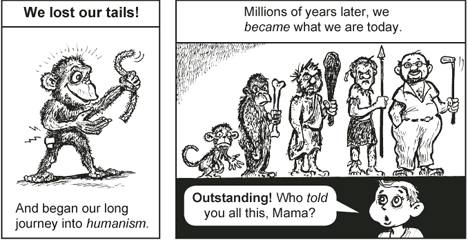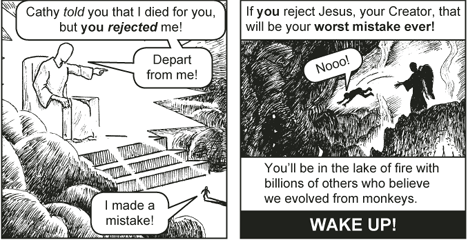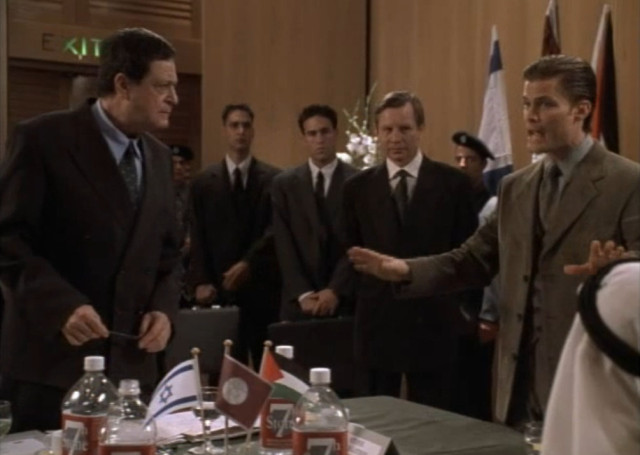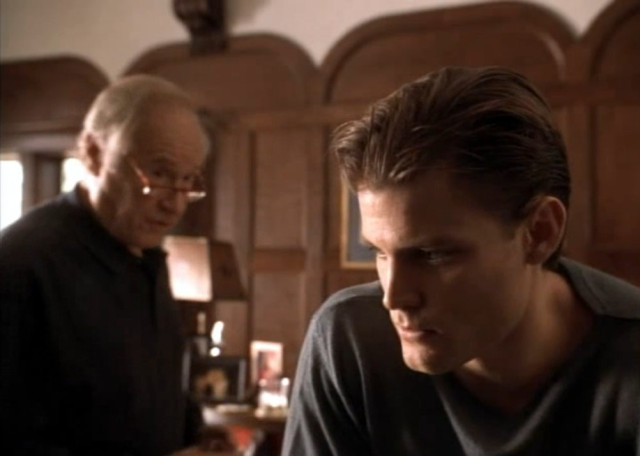 Earlier, Fr. Mike explained that the reason Christians are to follow some of the Old Testament commands and disregard others is a question of audience. Some were meant to be only for Israel while others are clearly meant for everyone. He tried to elaborate it with an example about homosexuality in the Bible in which he pointed out that the text points out that the nations surrounding Israel “defiled” themselves in this way (I guess by showing tolerance to the gay community) and that Israel was not to do the same. Thus, Fr. Mike contended, it was clearly meant for those other nations as well. That’s how he explained away the command not to wear clothes of mixed fabrics but insisted that the prohibitions against homosexuality were still binding.
Earlier, Fr. Mike explained that the reason Christians are to follow some of the Old Testament commands and disregard others is a question of audience. Some were meant to be only for Israel while others are clearly meant for everyone. He tried to elaborate it with an example about homosexuality in the Bible in which he pointed out that the text points out that the nations surrounding Israel “defiled” themselves in this way (I guess by showing tolerance to the gay community) and that Israel was not to do the same. Thus, Fr. Mike contended, it was clearly meant for those other nations as well. That’s how he explained away the command not to wear clothes of mixed fabrics but insisted that the prohibitions against homosexuality were still binding.
Alright, so let’s take that as a given for the sake of argument. I don’t think the point stands: I think it’s just a bunch of verbal sleight-of-hand (I know — horribly mixed metaphor). There’s nothing in the text that explicitly even suggests that some of these laws are binding for all people and some are not. Most Christians today don’t keep the OT feasts like the Feast of Tabernacles (also known as the Feast of Booths) even though Zechariah 14:16 states, “Then every one that survives of all the nations that have come against Jerusalem shall go up year after year to worship the King, the Lord of hosts, and to keep the feast of booths.” If anything seems directed toward all people, this surely is. By Fr. Mike’s logic, then, Christians should still be keeping at least observe the Feast of Tabernacles/Booths. Be all that selective-application-of-a-dubious-hermeneutic as it might be, let’s just take for the sake of argument that Fr. Mike’s interpretative principle is sound. What do we make of today’s reading, then?
Leviticus 20 is a brutal chapter. It lists the penalties for various infractions of the law. Most commonly, the penalty is death, and that death, most commonly, is by — guess! bet you’ll never guess it right! — stoning.
It starts out with a fairly disturbing command: “The Lord said to Moses, ‘Say to the people of Israel, Any man of the people of Israel, or of the strangers that sojourn in Israel, who gives any of his children to Molech shall be put to death; the people of the land shall stone him with stones'” (verses 1 and 2). This giving of children to Molech was always explained as child sacrifice. So it’s disturbing that child sacrifice is such an issue (or potential issue) that right out of the gate, the first penalty deals with this. We might think, “Well, that’s good. At least this god has the children’s good in mind.” That reassuring thought disappears as soon as we read verse three, though: “‘I myself will set my face against that man, and will cut him off from among his people, because he has given one of his children to Molech, defiling my sanctuary and profaning my holy name.'” So it’s not that they committed this awful cruelty to children, it’s not that they betrayed their responsibilities as parents, it’s not that they tortured children — no, it’s all about this god. Burning children is bad because it profane’s this god’s name. That’s just sick.
From that auspicious start, we have a whole litany of death:
- In verse 9, we’re instructed to kill incorrigible children: “For every one who curses his father or his mother shall be put to death; he has cursed his father or his mother, his blood is upon him.”
- In verse 10, we’re instructed to stone adulterers: “If a man commits adultery with the wife of[a] his neighbor, both the adulterer and the adulteress shall be put to death.”
- Verses 11 and 12 as well as 14 through 21 deal with the penalty for various forms of incest and beastiality. Death, of course.
- Verse 27 deals with those who supposedly talk to the dead: “A man or a woman who is a medium or a wizard shall be put to death; they shall be stoned with stones, their blood shall be upon them.”
As a side note, many people have demonstrated that this “talking to the dead” nonsense is just that — it’s cold reading. Derren Brown has walked into a room and convinced people he was talking to the dead just after saying to the camera, “I’m going to go in there and make them think I’m talking to the dead, but I’ll be doing no such thing.”
It’s verse 13, though, that stands out when juxtaposed to what Fr. Mike said earlier: “If a man lies with a male as with a woman, both of them have committed an abomination; they shall be put to death, their blood is upon them.” This is a clear condemnation of homosexuality. The question is this: if the prohibition of homosexuality is to be interpreted as universal, why shouldn’t the punishment be likewise?
Verses 22 through 24, though, is even more interesting, for it seems to demolish Fr. Mike’s whole distinction between universal and non-universal application of the Old Testmant law:
“You shall therefore keep all my statutes and all my ordinances, and do them; that the land where I am bringing you to dwell may not vomit you out. And you shall not walk in the customs of the nation which I am casting out before you; for they did all these things, and therefore I abhorred them. But I have said to you, ‘You shall inherit their land, and I will give it to you to possess, a land flowing with milk and honey.’ I am the Lord your God, who have separated you from the peoples.”
Fr. Mike argued that the earlier condemnation of homosexuality was universal because it was set in opposition to what the surrounding nations tolerated, but these verses do the exact same thing for all God’s commands.
So what does Fr. Mike in his post-reading reflection say about all this brutality? How does Fr. Mike deal with the verse that seems not just to undermine his earlier argument but to demolish it completely? Simple: he says nothing. He instead focuses on the other reading for the day, Exodus 27 and 28, which deal with the priestly garments, and he talks about his own experiences wearing modern priestly garments.
It’s not a problem if you don’t acknowledge it…



































